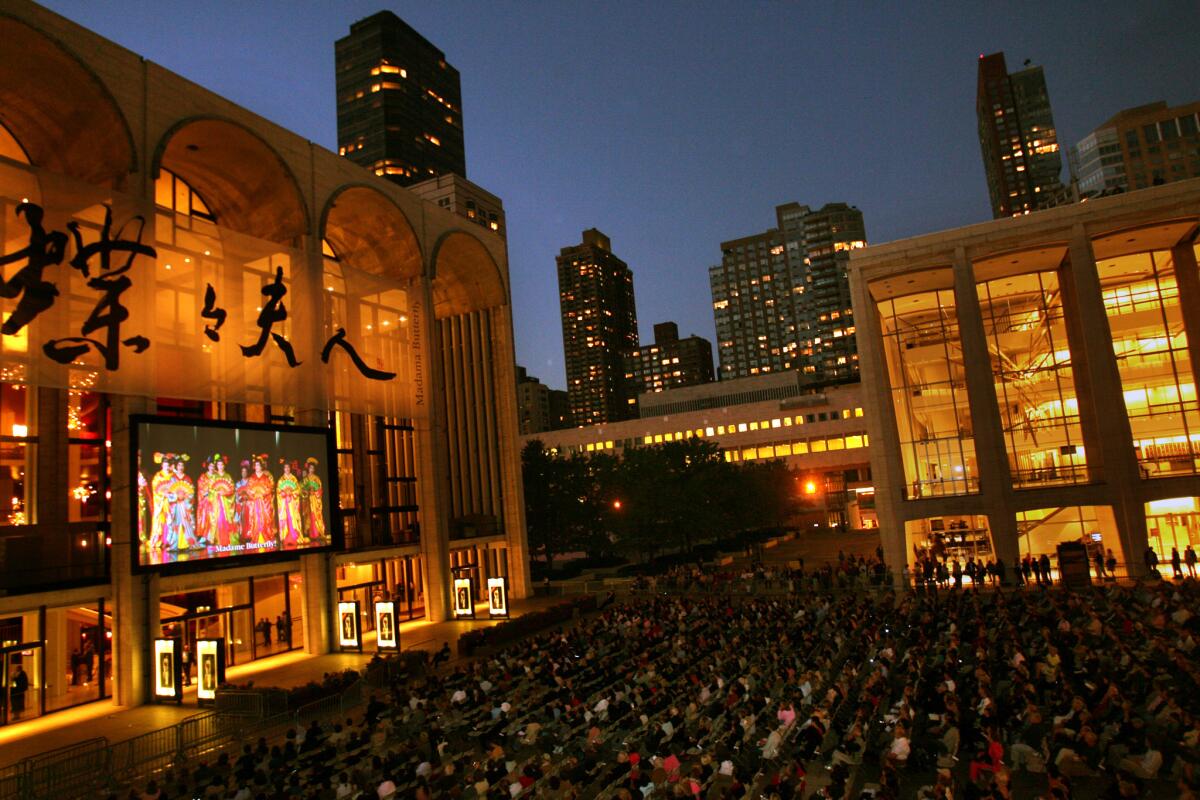Breaking: Metropolitan Opera musicians vote to wield strike threat in talks

- Share via
This post has been updated. Please see below for details.
The labor and financial drama that has become a discordant leitmotif in the opera and symphonic world could be building for the Metropolitan Opera, America’s biggest-budgeted performing arts company.
Orchestra musicians who perform in the vaunted opera house’s pit under music director James Levine’s baton announced that “devastating contract proposals from ... management” prompted them Monday to authorize their leaders to call a strike starting in August, if necessary.
Local 802 of the American Federation of Musicians, which represents the 96 core orchestra members, said the unanimous vote gave the orchestra’s contract negotiating committee the OK to declare a strike when the contract expires July 31, “should management’s intransigence warrant such an action.”
Jessica Phillips Rieske, the clarinetist who chairs the musicians’ negotiating committee, said in the union’s prepared statement that their aim is compensation sufficient “to attract and retain world-class talent,” and that “we remain hopeful that negotiations will have a positive outcome.”
Metropolitan Opera spokesman Peter Clark responded in a written statement that negotiations “have just begun” with the musicians and 15 other unions representing the Met’s employees, and that it hopes to reach new contract agreements by July 31.
Clark said that management’s initial proposal would not cut the musicians’ base pay, but included provisions that would reduce the Met’s orchestra costs by 16% to 17% by changing some benefits and work rules.
“Our singular goal is to control our costs in order to secure a sustainable business model that will ensure the Met’s future and the livelihood of its employees,” Clark said.
He and Laura Dolan, a spokeswoman for the musicians’ union, declined to state the musicians’ minimum base pay under the expiring contract.
The Met’s most recent available financial statement, for its 2012-13 season, showed that its overall financial picture improved markedly that fiscal year amid rising financial markets that helped its invested assets grow 15% to $302.8 million.
One of the company’s potential financial Achilles’ heels, an unfunded pension liability, was cut almost in half, from $128.4 million to $68.4 million.
But things were less rosy inside the storied opera house at Lincoln Center than they were on its investment ledgers. Box office and touring revenue was down $5 million, to $89.8 million, and the Met finished with an operating deficit of $2.8 million.
The Met’s net assets rose $62 million to $226 million in 2012-13 despite the tepid box office returns, and its unions may argue that they deserve a share of the financial gains realized in a market upswing that began in mid-2012.
Management, in turn, might point out that the company has been on a financial roller-coaster and needs to smooth out the ride. The market-driven gains in 2012-13 did not offset a $93-million drop in net assets the previous year.
In Southern California, financially driven board and management upheaval has threatened San Diego Opera’s existence this spring. Its board voted in March to shut down the 49-year-old company for good in the face of dwindling earnings and donations. A public outcry followed the unexpected decision, and the minority of the board that didn’t resign is trying to redesign the company on the fly. It has envisioned a scaled-down operation that anticipates spending $10.5 million in its next season – if enough money can be raised to allow the season to be scheduled. Past budgets typically exceeded $15 million.
The Met’s operating expenses for 2012-13 totaled $326.8 million. Clark put the current season’s budget at “slightly more than $300 million,” adding that labor costs account for about two-thirds of the total.
Contract negotiations also have been difficult for a number of non-operatic symphony companies over the last few years, with strikes hitting the San Francisco Symphony and Chicago Symphony, and a prolonged lockout for the Minnesota Orchestra.
The Los Angeles Philharmonic has enjoyed labor peace, quietly reaching contract agreements with its musicians without any public contention. The one OKd in September will run through mid-2017, lifting the minimum base pay for orchestra members 3.8% over four years, from $148,700 to $154,336.
For the Record, May 15, 4:15 p.m.: An earlier version of this post incorrectly gave $6.5 million as the projected budget for San Diego Opera’s 2015 season.
More to Read
The biggest entertainment stories
Get our big stories about Hollywood, film, television, music, arts, culture and more right in your inbox as soon as they publish.
You may occasionally receive promotional content from the Los Angeles Times.











